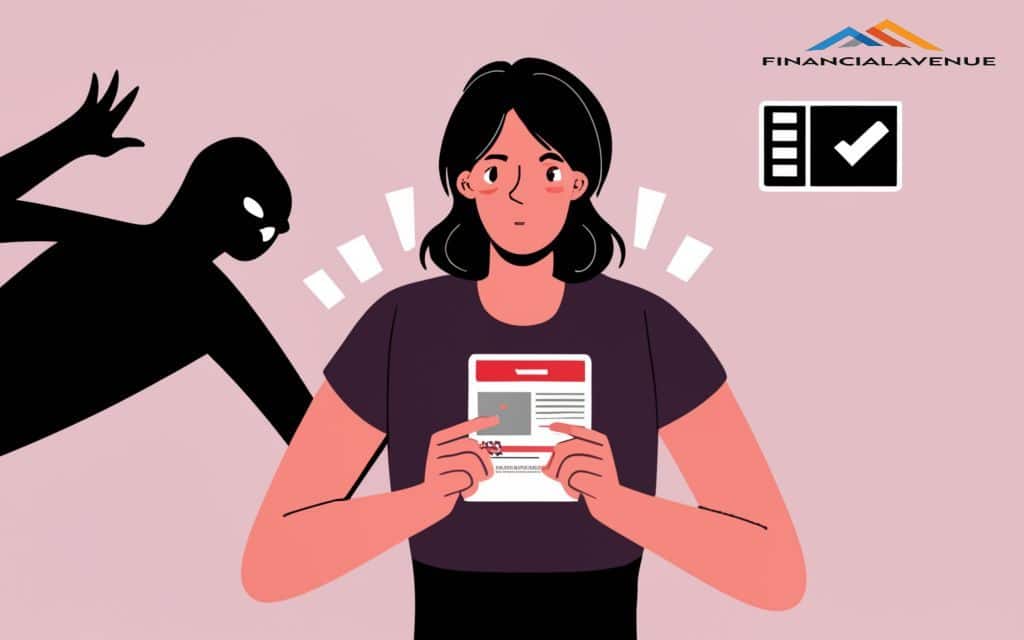Identity theft is an extremely unsettling form of fraud and if someone is using your name and address fraudulently, it’s a nightmare. A criminal obtains someone’s personal information. The criminal then uses the information to open fraudulent accounts or make purchases in the victim’s name. This can wreck financial accounts, credit scores, and leave victims facing a huge mess to clean up.
If you suspect someone has gained access to your personal details for illicit purposes, it’s critical to take swift action. This is to stop the fraud, reclaim your identity, and prevent further damage. This guide will provide comprehensive advice on essential steps to take when responding to identity fraud.
Key Takeaways: Responding to Identity Fraud
If you discover someone has accessed your personal information and is exploiting it fraudulently, here are vital steps to take:
- Gather paper records proving precisely how your identity was misused
- Report the fraud to financial providers, credit bureaus, and police/Action Fraud
- Close breached accounts and strengthen security on existing ones
- Sign up for protective registration and monitor closely for repeat offenses
Spotting the Warning Signs
You may first suspect your identity has been compromised if you notice suspicious activity that indicates someone is fraudulently using your personal information:
- Bills or collection notices for items you didn’t purchase: One of the most common signs of potential identity theft is receiving charges or correspondence regarding accounts or purchases you never made. These could be bills from retailers, collection agencies contacting you about unpaid balances, or service notices regarding accounts you don’t recognize.
- Errors on your credit report: If someone has used your information to open fraudulent credit cards or loans in your name, this activity could show up on your credit report. Regularly checking your credit report is vital for catching issues early.
- Suspicious credit score changes: Along with errors on your report itself, having accounts opened in your name can negatively impact your credit score. Keep an eye out for any unusual dips in your score.
| Type of Suspicious Activity | Potential Signs |
|---|---|
| Fraudulent Purchases | Bills for items you didn’t order; debt collection calls about mystery accounts |
| Credit Report Errors | New accounts you don’t recognize; loans you didn’t take out |
| Credit Score Changes | Sudden unexplained score drops |
If you notice any suspicious financial activity, it’s essential to act quickly to halt further fraud and clear your name.
Learn more if you can Pay Rent With A Credit Card
Gathering Evidence of the Fraud
If you discover warning signs someone has stolen your identity, your first priority should be formally documenting evidence of the fraudulent activity. Compiling proof will be necessary for reporting the fraud to authorities and financial institutions as well as clearing your name moving forward:
- Obtain records linking you to the fraudulent activity: For example, gather copies of bills and statements for accounts opened in your name, error notifications from credit bureaus, or collection notices referencing charges you didn’t actually incur.
- Document contact from creditors about false accounts: If you receive phone calls or emails from creditors seeking payment for accounts you don’t recognize, thoroughly log these interactions including names, dates, and contact information.
- Take screenshots reflecting misuse of your information: If you discover false online profiles, fraudulent fundraisers, or other digital impersonation using your identity, take screenshots for evidence. Print and save all proof of unauthorized use of your personal details.
Having ample evidence of precisely how your identity was compromised and misused. This will vastly simplify reporting the fraud to the necessary authorities. Keep compiling records until you’ve established a thorough paper trail of how the criminal activity impacted you financially, professionally, and personally.
You might be interested in learning if A Bank Transfer Be Reversed?
Contacting Relevant Authorities
Once you’ve gathered evidence about the identity fraud, promptly contact all relevant authorities. You’ll need to report the compromise of your information and reclaim your financial identity. Key groups to notify about the identity theft include:
Financial Institutions
If you spotted suspicious charges or accounts opened under your name, inform your bank and financial providers. They need to know about the activity. Provide details about exactly what fraudulent transactions or accounts you discovered and share confirming documentation. Financial institutions can shut down fraudulent accounts, stop additional charges from being approved, and help protect access to your assets.
Credit Bureaus
Since identity thieves may open credit cards or loans in your name, reporting information to the three major credit bureaus is critical. This resolves credit report errors and prevents additional accounts from being approved without your permission.
You can report fraud to each bureau individually or place an extended fraud alert simultaneously with all three:
- Equifax
- Experian
- TransUnion
When you contact the bureaus, supply copies of any evidence you have related to fraudulent accounts or charges. The credit bureaus can then remove inaccuracies from your reports to reflect the true state of your credit. Make sure to request a free copy of your credit report from each bureau to verify false accounts have been removed.
Learn How to Cash a Cheque?
Police
Reporting identity fraud to your local police or the dedicated Action Fraud service is necessary. This initiates a formal investigation into the compromise of your personal details and holds the perpetrators legally accountable. Provide the paper trail you assembled mapping out precisely how your identity was misused financially or otherwise. This evidence trail supports building a case against the fraudsters responsible. Depending on investigation outcomes and evidence gathered by authorities, it may be possible to prosecute the identity thieves.
Further Steps to Secure Your Identity
Once you’ve reported the fraud to key groups like your bank, credit bureaus, and police, additional essential precautions can help fully reclaim your identity and protect yourself moving forward:
- Close compromised accounts and open new ones: Shut down bank accounts, credit cards, or other financial accounts that were accessed or opened fraudulently. Open replacement accounts with new account numbers, passwords, and enhanced security protections enabled.
- Change account passwords and security info: Update the passwords, PINs, security questions, and other access credentials for your financial accounts to completely block out anyone who previously infiltrated your private data.
- Sign up for protective registration: Place your name on the Protective Registration service to red flag your identity as at risk for fraud. This adds extra scrutiny for anyone applying for credit or official documentation in your name.
- Monitor account activity vigilantly: Carefully review statements and reports to ensure new fraudulent activity doesn’t emerge going forward. Unusual charges, credit inquiries, or account changes should be reported immediately.
Learn: Is eBay Safe? These Scams Can Be Costly!
Final Words
Acting rapidly to report fraud and lock down your accounts can help restrict damages from identity theft. This prevents criminals from further hijacking your name and private data. Being vigilant about unusual financial or account activity and reviewing credit reports regularly makes catching fraud faster as well. Keep your information as secure as possible. Don’t hesitate to contact the proper authorities regarding suspicious use of your identity.

Daniel, a seasoned professional with over 5 years of experience in banking, property, and finance, brings a wealth of expertise to the table. This authoritative blog is meticulously curated to provide you with the most up-to-date financial insights. Delving into the dynamic realms of banking and mortgages, Daniel’s passion for finances shines through every post.










